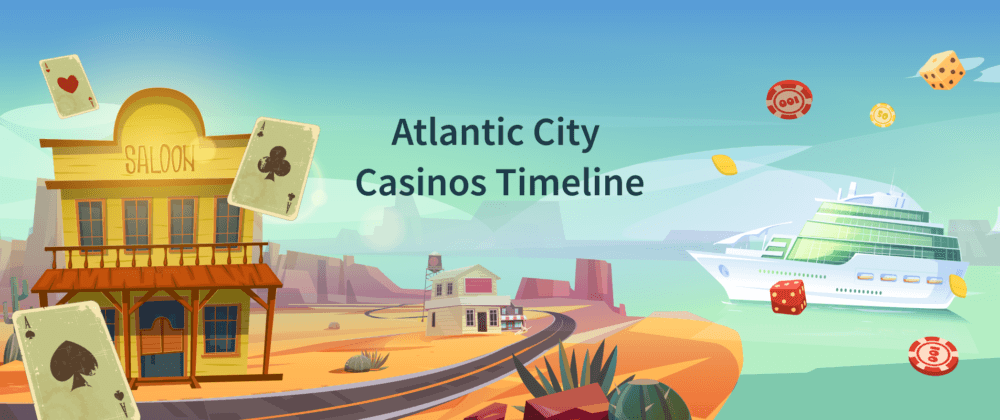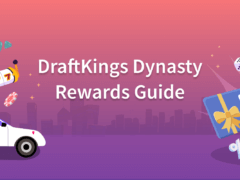The Atlantic City of the 19th century was a small city on the seaside with outstanding real estate opportunities. The Belloe House was the first Atlantic City hotel, built in 1853. Originally, Atlantic City was planned to be the center of health resorts. However, new hotels kept appearing as they matched the seaside scenery. Due to the location being near the beach, sand kept getting onto the hotel lobbies, and the boardwalks that were supposed to be renewed each season ended up getting extended. The length and ease of access increased traffic to the beach resorts. In 1897, the government prohibited all forms of gambling.
Atlantic City Casinos History and Timeline: Original Atlantic City Casinos & More

 5.2K
5.2K
For those who have experienced the gambling industry in Atlantic City, you might be familiar with the thriving establishments. Places like the Boardwalk became a major tourist destination, akin to various casinos and casino resorts with exciting entertainment. However, Atlantic City casino history has come a long way until it became what it is currently.
The development of the Atlantic City gambling landscape has been impressive. It’s now the most renowned gambling area on the East Coast. By 2012, New Jersey’s casino industry had employed over 34,000 people and acquired gross revenues of $2.9 billion in 2013. However, Atlantic City took a long time and great effort to elevate its gambling industry to what it currently is. Find out more about the history of AC casinos and gambling in the city in our comprehensive timeline.
Timeline of Atlantic City Casinos and Gambling in New Jersey
Let’s dive into Atlantic City casinos history and see how the city started and developed its gambling industry over the years.
1850 - 1900: First Hotel is Built
1900 - 1945: Getting Creative Amidst Prohibition
Although the government prohibited gambling in Atlantic City in 1897, it wasn’t until 1919 that the ban passed into national law. It was then reinforced in 1920. Despite the prohibition, local providers wanted to offer all services requested by their customers, including gambling entertainment. Multiple underground casinos, speakeasies, and Italian lotteries disguised as the numbers game started appearing.
Louis Kuehnle owned one of the first hotels offering gambling house services. Backing up Kuehnle was Enoch ‘Nucky’ Johnson, a prominent figure in Atlantic City history who took charge of the Atlantic City Republican Executive Committee. His position allowed him to promote activities linked to vices, including gambling and drinking. His actions contributed highly to Atlantic City’s revenues and improvements.
However, the Great Depression in 1929 led Atlantic City to significant downfall in visitors. Prohibition ended in 1933, and in 1941 Nucky, alongside several profiteers, got caught for tax evasion.
1945 - 1970: Impact of WWII
Due to the impact of WWII, not only the number of visitors, but the number of residents in Atlantic City decreased significantly. Several hotels were demolished and abandoned as well. However, this period was the starting point of the gambling industry revolution in Atlantic City.
1970 - 1975: New Jersey Casino Referendum
Although the opportunities for revenue improvements from jobs, tourism, and tax, many still worry about the downside effects of gambling legality. By the early 70s, Nevada was the only state that legalized gambling. With Nevada as an example, more New Jersey residents voted against the legalization in the 1974 New Jersey casino referendum.
Those voting against the legalization feared malicious organizations taking over the industry and heightened the crime rate. There were many worries that legalization would lead to the exploitation of vulnerable residents and corruption.
1976: New Referendum Passed
Despite being overpowered by residents going against the legalization, those agreeing believe that allowing casinos will be the right solution to improve Atlantic City. They revised the referendum only to legalize gambling in the city rather than state-wide. The new version of the referendum passed in 1976 by a slim margin of 56% votes.
1977: Atlantic City Legalized Gambling
Atlantic City legalized casino gambling in mid-1977. Governor Brendan Bryne approved the legalization and signed the New Jersey Casino Control Act. The Casino Control Act stated that redevelopment of existing facilities would provide a unique opportunity to optimize the natural resources of Atlantic City.
On the gambling side, the Act stated that only established hotel and convention facilities could claim casino licenses. The rule aims to preserve the hospitality industry of New Jersey and Atlantic City. In short, the Act allows various establishments to offer gambling entertainment, but not as standalone businesses.
1978 - 1979: First Casino Opens
Resorts Atlantic City on Boardwalk became the first casino in Atlantic City to operate legally. In 1978, the casino resort officially offered its services to the public. Resorts Atlantic City is now known as the oldest casino in Atlantic City. At the end of the 70s, Bally’s Park Place and Caesars Boardwalk Regency followed to open their doors as casino resorts. Both establishments became Caesars Atlantic City and Bally’s Atlantic City.
1980: Casino Boom
The legalization triggered a casino construction boom across the city. The Brighton (now Sands Hotel and Casino) opened its business in 1980. Harrah’s Casino Hotel followed, alongside the Golden Nugget (now Atlantic Club Casino Hotel) at Boston Avenue.
1981: More Openings
Hi-Ho Casino and Del Webb’s Claridge opened, later merging and becoming Bally’s. The Playboy Hotel & Casino (later The Atlantis), Trump’s World Fir, and Trump Regency opened in the same year. The last one to open was the Tropicana Casino and Resort (now Tropicana).
1984-1990: Rise of Trump Plaza
Harrah’s Boardwalk Hotel Casino opened at Trump Plaza, becoming the biggest casino in Atlantic City. The establishment later changed its name to Trump Plaza Hotel and Casino Atlantic City. Approximately a year later, Hilton constructed the Million Marina Casino project. However, it was unable to obtain a casino license. Trump bought the establishment and finished the construction, resulting in Trump Castle (Trump Marina Hotel and Casino).
Golden Nugget in Marina District officially offered its services to customers the same year. In 1987 The Showboat Casino Hotel opened, followed by the Trump Taj Mahal Casino Resort in 1990.
The casino construction boom brought a significant revenue increase to the history of Atlantic City casinos. By 1988, Atlantic City casinos had produced $2.37 billion of revenues for the government, which went above Las Vegas’ $1.9 billion in the same year.
2000: Revamping
Atlantic City had 12 casinos by the year 2000, and the total revenue from all 12 went to a whopping $4.2 billion. The revenue consistently increased each year, with 75% coming from slot machines. As the Trump Taj Mahal offered the highest number of slot collections of 4,700 machines, the establishment brought the highest revenue.
The bad news is, by 2000, all casinos in Atlantic City started to appear dated. Steve Wynn realized that and decided to build a more modern casino establishment in the marina. The key to the project’s success is if the government decides to finally make a tunnel connecting Atlantic City Expressway to the area he was planning to build the casino.
Several residents were against the project, and since the tunnel won’t have an exit leading to Trump Marina, Trump also jumped in to oppose the project. Ultimately, the Atlantic City-Brigantine Connector was built with an exit towards Trump Marina included.
2003: Las-Vegas Style Hits Atlantic City
Wynn, who had bought MGM Mirage Company, partnered with Boyd Gaming. Together, he planned to open a casino hotel called Borgata Hotel Casino and Spa in 2003, the offline version of the modern Borgata NJ Online Casino, as well as home to one of the best poker rooms in AC. The establishment became the first Las Vegas-style casino hotel in Atlantic City. Not only the casino hotel offered a classy nightlife scene, it included dining options that Atlantic City hadn’t had until then.
Poker became popular after Chris Moneymaker won the 2003 World Series of Poker Main Event, and Borgata became the main character alongside Moneymaker. The casino hotel hosted numerous World Poker Tour events on television and expanded its poker room with additional 50 tables. Borgata quickly became the top poker destination on the East Coast, although still new in the New Jersey gambling industry.
2006 - 2009: Sands Closes
Borgata was a power to be reckoned with in Atlantic City gambling history, but many tried to compete with the casino hotel and other first casinos in Atlantic City. However, many were also impacted negatively due to tight competition.
Several original Atlantic City casinos started closing or stopped offering gaming services. One of the establishments that decided to close its doors was Sands. As it closed in 2006, the city’s revenue remained strong. However, it started to shake.
Atlantic City Casinos were demanded to close for three days due to the government shutdown in 2006. Although Borgata managed to maintain its revenue and the gambling industry made a mark in the history of Atlantic City with $5.2 billion, a big dip followed right after.
After Sands closed, the revenue lowered to $4.8 billion in 2007. It went even lower, slightly under $4.5 billion in 2008 and $4 billion in 2009.
2012: Revel Casino: A Rollercoaster Ride
Revel, which started construction in 2007, was expected to open in 2010. However, due to funding problems, the casino was still under construction in 2011. It successfully opened in 2012, but was quick to gather debt and went bankrupt a year later. The company attempted to save the establishment by changing the property into another of the AC casino hotels, but it failed once again and filed for another bankruptcy. Revel closed in late 2014. However, the casino was reopened as Ocean Casino Resort in 2018 after a massive expansion and redevelopment.
2013: Online Casino Legalization and AC Casino Partnerships
With the legalization of online casinos changing Atlantic City gambling history forever, a regulatory framework set out by the New Jersey Division of Gaming Enforcement (DGE) decided that legal New Jersey online casinos must partner with a land-based casino in order to become legal and regulated.
This decision was made to ease regulatory oversight, as having a retail partner allows the DGE to use already-existing infrastructure as well as new guidelines for online casinos; it has since become the standard practice in US casinos. These partnerships also served to benefit retail casinos, with a new income stream from the online platform, as well as potentially increased footfall in the physical casinos thanks to the partnership.
2020: The Havoc Caused by COVID-19
Like many industries that relied on heavy footfall, the Atlantic City casino scene took a huge financial hit when it was forced to close on March 16, 2020, in an effort to curb the spread of Coronavirus.
When casinos opened around three and a half months later, on July 2, 2020, the damage had already been done, with almost every casino reporting large losses, which continued as casinos were now limited to 25% capacity alongside other strict guidelines.
Financial losses and increased operational costs meant job losses were inevitable, and many regular gamblers turned instead to online gambling due to the various limitations put in place in their favorite brick-and-mortar establishments.
2022: Smoking in Atlantic City Casinos
After the reopening of casinos, which were closed due to COVID-19, casino workers justifiably began questioning the legality and ethics of smoking inside AC casinos that currently enjoy an exemption from the New Jersey Smokefree Air Act.
With health concerns over issues that are only worsened by COVID-19, workers and smoke-free charities began organizing strikes and rallies and petitioning lawmakers to amend the exemption. The issue is still ongoing, as smoking on up to 25% of the casino floor is still legal. Casino bosses urge lawmakers to keep the exemptions in place, as they fear a double-digit revenue loss should a ban be implemented.
FAQ
When did gambling start in Atlantic City?
Gambling was first legalized in 1977, and the first casino opened in the city in 1978. After Resorts Atlantic City offered its service, the legal gambling scene started in AC.
What was the first casino in Atlantic City?
Resorts Atlantic City was the first casino to open in AC.
What were the original Atlantic City casinos?
Following the first-ever opened casino in Atlantic City, Resorts Atlantic City, two other casinos quickly followed: Bally’s Park Place, now known as Bally’s Atlantic City, and Caesars Boardwalk Regency, now known as Caesars Atlantic City.
What was the second casino built in Atlantic City?
Caesars Boardwalk Regency, or Caesars Atlantic City, is the second casino built in Atlantic City.
What is the oldest operating casino in AC?
Opened one year after the law legalized gambling in New Jersey, Resorts Atlantic City, now Resorts Casino Hotel, is the oldest operating casino in AC. It opened in 1978 and is still operating.
When was the peak of the Atlantic City gambling industry?
In 2006, the city managed to earn $5.2 billion in revenue from the gambling industry. It was the peak of the city’s gambling revenue and had never been surpassed until now.
What was the Ocean Resort casino before?
Ocean Resort Casino started as Revel Casino. After closing in 2014, the casino underwent redevelopment and expansion, then reopened as Ocean Resort Casino.
Is smoking allowed in Atlantic City casinos?
Yes. Currently, the New Jersey Smokefree Air Act has an exemption for casinos to allow indoor smoking on up to 25% of the casino gaming floor.
When did Atlantic City casinos reopen?
All Atlantic City casinos were temporarily closed by law on March 16, 2020, and were reopened about 14 weeks later on July 2, 2020. When they reopened, however, they were under strict guidelines, such as a maximum capacity of 25% and no indoor smoking.










